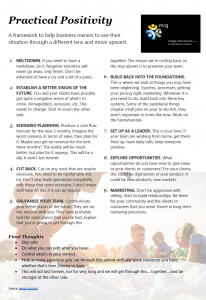Posts Categorized: Tips of the week
Binding death benefit nomination
For a binding death benefit nomination to be binding:-
-
It must be made in favour of a tax dependent.
-
It must be done using the approved form for the fund.
-
It must be witnessed.
-
It must be made whilst having mental capacity (so an elderly person may be wise to have their GP assess their cognitive powers).
A binding death benefit nomination only holds for 3 years. After 3 years, it loses its validity.
Whilst a binding death benefit nomination must be followed by the super fund trustees and therefore creates certainty, it may not be the best option for you.
You should not execute a binding death benefit nomination until you have completed a full estate planning review and done so with the input of your accountant, financial planner and estate planning lawyer.
Tips to stay positive in the face of COVID-19
We are doing all we can to help our clients. With this in mind, we publish below a series of tips to stay positive in the face of COVID-19.
We give thanks to the UK’s James Ashby who has allowed this document to be openly shared.

COVID-19 matters
We are sorry to have not posted over recent weeks.
In the face of various COVID-19 matters, we have been flat out:-
-
Helping our clients with their challenges,
-
Creating a Business Continuity Plan and support program,
-
Creating and delivering Friday’s business survival webinar,
-
Undertaking necessary precautions internally, and
-
Preparing ourselves for a possible office closure.
We can now return to providing more regular blogs and if you aren’t an existing client, welcome the opportunity to assist you to be informed and in control in these volatile and uncertain times.
SG amnesty – prior reported breaches
An employer who is late in paying their super must pay it to the ATO on an SG Super Charge Statement.
An admin charge and lost earnings component are added to the amount payable. Worse still, the total amount paid is not tax deductible. As we always say super liabilities are the liabilities you pay first.
Last week the SG Amnesty laws were passed by Parliament. This amnesty allows employers to report and pay any underpaid super and do so without the usual penalties.
What it also enables is those that have previously lodged a SG Super Charge Statement to seek a refund.
We welcome the opportunity to assist you with this and will provide guidance once we have been trained on the amnesty.
ATO focusing in on investment strategies
The ATO is focusing in on investment strategies.
Last September they wrote to, and scared the life out of, 17,700 self managed super fund (SMSF) trustees.
Last week they released their guidelines. We will explain their approach and demands as we study these guidelines.
We will also be in discussion with our SMSF auditor.
We do not believe any major shift will be applied retrospectively.
Reducing tax on the former home

An often over looked way to reduce the tax paid on the sale of a former home is to use the six year absence rule.
The net rent you receive is assessable (or deductible if negatively geared) but the gain itself can be disregarded.
However, you must take care when choosing to use this method when you live in another home. One is only entitled to one principal residence (family home) exemption so choose carefully
We would welcome the opportunity to discuss what is best for you. We welcome your call.
Maximise your health insurance entitlements
The end of the year is fast approaching. So amongst your festivity planning, make sure you maximise your health insurance entitlements.
Health funds re-set their limits for extras come January. If you have an unused cap for things such as dental, physios and the like, you may wish to use up your health insurance entitlements before they are lost.
Seeing the physio might be a good move if, like me, you seem to be carrying and lifting a lot of heavy things over the next 30 days!
Don’t forget to register for GST!
Don’t forget to register for GST! If you don’t it could be costly.
The GST registration threshold for businesses that are not non-profits and taxis is $75,000. If your annual turnover exceeds $75,000 and you are not registered, then the ATO will demand you pay them 1/11th of your turnover.
It can prove rather costly!
Where turnover is not seasonal, we recommend that clients register once their turnover exceeds $6,000 per month. And sometimes earlier if they will soon be at the limit and have good accounting processes (which we can help set up).
Not sure what is best for you – call us for a free discussion.
How can I claim car travel?
In order to claim car travel in your personal Tax Return:-
-
You must own the car.
-
You must have undertaken a trip for either your business or your employer.
You can claim under two methods:-
-
Log book, or
-
Cents per kilometre
Tip
You can use a log book kept for three months in the current year or in the last four years (provided the pattern of travel hasn’t changed significantly).
Tip
You must have a properly kept log book. You can do so by buying one in a stationers or you can access an electronic one form our firms app.
Tip
You can claim 68 cents per kilometre under the cents per kilometre method for up to 5,000 work/business strips. This means you can still claim 5,000 km where you travel say 5,500km. Some people choose to do so as it gives them a better claim than under a log book. All you need is a reliable estimate of all trips undertaken during the year.
Want to know what works best for you – call us. We even have a salary sacrifice calculator so we work out the best way to package up a work car and minimise the Fringe Benefits Tax.
When can I claim a bad debt as a tax deduction?

When can I claim a bad debt as a tax deduction?
You have to satisfy a few conditions:-
-
There must have been an enforceable sale.
-
All reasonable attempts have been made to collect it.
-
The decision to write off it off is evidenced in writing.
-
The customer hasn’t already gone into liquidation or you haven’ t accepted a deal to be paid only x cents in the dollar.
That all said, if you declare income on a cash basis then there is no deduction to be claimed for a bad debt as there wasn’t any taxable income in the first place.
So how do you avoid the cost of a bad debt? Look out for future blogs including what the real costs of a bad debt can be.
Or better yet, ask us.
We have dozens and dozens of ideas and strategies from dealing with hundreds of clients from many different industries.
